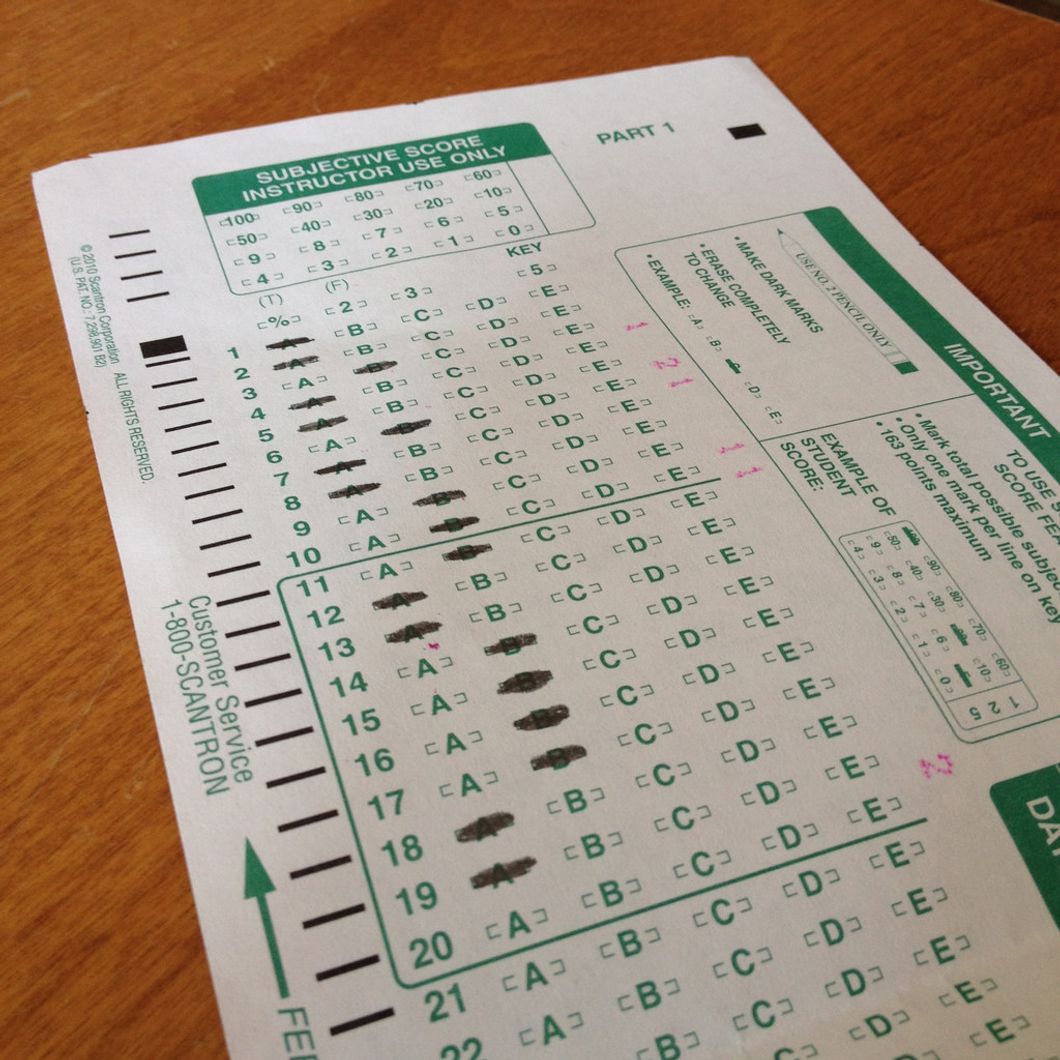We Need To Stop Shaming Poor Folks For How They Spend Their Money
No one is poor because of the $200 they spent on a new smartphone.
USA Today recently published an article that was quickly noticed on Twitter with its headline and corresponding infographic: "Average American spends almost $18,000 a year on nonessentials". The Tweet was quickly met with disagreements, mostly stating that many of the "nonessentials" listed on the infographic were actually anything but. It listed things such as "buying lunch," "takeout/delivery," "personal grooming," and "rideshares" as "nonessential purchases," and the article adds gym memberships and fitness classes to the mix as well. My question (as well as everyone's question who angrily replied on Twitter) to USA Today is this: Are some of these items really "nonessential?"
If you ask me, they're not. This article reeks of the ignorant idea that so many people in western, Capitalist countries (specifically the United States) seem to hold: That people who are poor/struggling financially have no one to blame but themselves, and that they dug themselves into that hole through bad work ethic and unnecessary spending. This just simply isn't true. The issue of poverty in the United States is a complex one, and one that involves generational poverty and the near-unbreakable cycle that it invokes. If someone is born into a low-income family, it's extremely difficult for that person to break off from this and build themselves up into the next economic class.
Now, the article doesn't outright mention the lower class; it mentions all Americans, which includes everyone from the top one percent to the people with only the clothes on their backs. However, it's flawed in that it doesn't take into the account the necessity of some of these "nonessential" purchases, especially to lower income folks. One great example is "personal grooming." Especially in a society where physical appearance is emphasized so aggressively and can even make or break someone's opportunity at employment, since when is getting a haircut "nonessential?" Not to mention "buying lunch," which is probably a daily activity for, I don't know, every employed American adult? The mention of "rideshares" is wildly ignorant as well, as it completely disregards the necessity of these services to people who don't have cars or are otherwise unable to drive themselves places. Public transportation is an option, too, but it's really only regularly available in big cities. Another thing to note here is how potentially irresponsible it is to promote decreasing the use of rideshare services when so many people use Uber or Lyft to get home safely after a night of drinking.
There definitely are categories that they listed in the article that really are nonessential, such as music and movie streaming services, paid apps, or subscription boxes. However, what the article is essentially telling people to do is cut these out of their lives so that they have more money to spend on things like retirement, health insurance, and so on. While it's important to save, and many of us could cool it on the shopping and put more into our savings, this advice is completely out of line when comparing the cost of some of these so-called "luxury items" to necessary purchases and savings. The message that this implies is that if you're struggling with money, specifically with necessary costly purchases such as medication, healthcare, rent, etc., it's because of the (much smaller) amount of money that you're spending on "unnecessary purchases." And this makes absolutely no sense. People do not fall into poverty or stay under the poverty line, because they're spending money on a smartphone bill every month or paying $10 a month for a Netflix subscription. The fact that there are people in this country that are struggling with their finances to the point that they can barely feed themselves or their children is a structural problem, not a personal one.
In addition to this, telling people--specifically poor folks--that they don't deserve to buy nice things for themselves or their families in order to survive is extremely dehumanizing. Everyone deserves to own nice things, whether that's a laptop, the newest iPhone, or a car that isn't falling apart. People shouldn't have to buy only what they absolutely need to survive in this world. The real issue at hand here is the mere fact that there are people in this wealthy, first-world country that are living in poverty, and the message that this article sends completely dismisses that. This is telling poor folks "If you're struggling to pay your bills, maybe you shouldn't have bought all those clothes for your kid" or "Maybe you shouldn't have splurged on that expensive lunch that one day." It completely ignores all of the real, complicated issues that tie into poverty and dumbs it down to minuscule personal spending.
Of course, there are some Americans who spend more money than they should. I've definitely bought clothes before that I didn't need, or a name-brand highlight palette that I totally could have lived without. However, purchases like these are ultimately never going to have any impact on whether I can pay my own bills one day, and this is even more true for people who have far less money than I do. As a society, we need to stop yelling at poor folks for the "luxurious" items they buy and think more about the structural issues that have led to a country where some people can own multiple million-dollar homes, while others are forced to sleep on the street.





































Rich White Parents Can Bribe Their Kids' Ways Into College But People Are Still Mad About Affirmative Action
For years, the rich have been using their personal connections and vast wealth to continue bringing in opportunities for their lackluster children, yet for some reason, no one seems to bat an eye.
Wealthy people are paying for their kids to get into college?
*Gasp*
Honestly, tell me something I don't know.
On Tuesday, the FBI exposed a multimillion-dollar college admissions scandal executed by some of the most wealthy and prominent families in the U.S., two of which happen to be Hollywood household names. These overzealous and exceedingly wealthy parents participated in scandalous and unethical behavior, such as paying others to take their teen's admissions exams, as well as bribing college officials to say that their children were athletic recruits when they weren't athletes at all.
The most notable names from the list of 50 individuals charged are Lori Laughlin, former cast member of TV's "Full House," and Felicity Huffman, known for her role in "Desperate Housewives" as Lynette Scavo. These women appeared innocent on TV, but it's clear that the cookie-cutter demeanor their characters displayed couldn't be further from their true colors.
If we're being honest here, the only reason this is newsworthy is that the wealthy people being indicted are celebrities — not because college admissions scams are a new occurrence.
It's no surprise that the colleges where these scams have taken place have all been prestigious universities like Yale, Stanford, and UCLA. These institutions have a history of being exclusive, as well as placing money above intellect and ability. As the saying goes, "It's not about what you know, but who you know."
For years, people have been using their personal connections and vast wealth to continue bringing in opportunities for their lackluster children, yet for some reason, no one seems to bat an eye.
We all know it's going on, but no one is complaining and no one tries to stop it. It's almost as if we've just accepted that that's the way things are. Meanwhile, I hear at least one ignorant comment about affirmative action a year.
I'm being serious. It's like clockwork.
As a minority, you constantly feel as though you have to "prove" that you belong in certain spaces, especially those that are typically seen as reserved for the white, wealthy majority. With this country's history of limiting minorities' access to education, colleges and universities are definitely included in the list of those spaces. The idea that we don't belong in these spaces, nor are we good enough for them, is still highly prominent in our society, even though there have been vast increases in the percentage of minorities enrolled in postsecondary education.
As a minority student, your talents and abilities are constantly undermined, while your success is seen as the result of some type of "help."
Even though the majority of minority students busted their asses to get into college (and bust our asses every day to stay there), we are always verbally assaulted with the "affirmative action" slander. I once went to see a lecture by a distinguished marine biologist. He told us a story about someone harassing him during the early days of his career, telling him "it's because of affirmative action and people like you that I didn't get into [Harvard]." In 2008, a clueless and grossly privileged young white woman tried to sue the University of Texas for using affirmative action to discriminate against her (but the truth is that she was just a mediocre student). And for a personal example, I once sat across from one of my peers at the Honors College and heard him say "I have to look super good on my med school application or else I won't get in... Because, ya know, I'm white."
The idea that the only reason Blacks and other minorities receive opportunities is because of affirmative action needs to die.
Not only is it the furthest thing from the truth, but it is just another way to denigrate an entire group of people and diminish their accomplishments. Why are minorities always blamed when a white person doesn't receive the opportunity they think they deserve? The same people who think it's preposterous to say that white privilege exists are the same people claiming how "unfair" affirmative action is.
The truth of the matter is that affirmative action is not some sort of privilege to minorities (Blacks are still the smallest population of those currently attending college), and minorities aren't "stealing" opportunities from anyone. Perhaps if we acknowledged that the biggest threat to integrity in college admissions are wealthy and elite, we could end this tired debate around affirmative action and stop the actually mediocre kids from getting into colleges they don't deserve to attend.